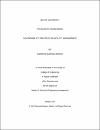SUSTAINABILITY PRACTICES IN FACILITY MANAGEMENT
| Advisor | Ouahrani, Djamel |
| Author | Abdoh, Shorook Bassam |
| Available date | 2017-03-06T10:06:36Z |
| Publication Date | 2017 |
| Abstract | Facilities management (FM) has witnessed a pragmatic growth and its importance has increased parallel to the expansion of the construction sector. Meanwhile, the concept of sustainability is being established and is considered an essential topic nowadays. Sustainability standards and accreditations are adapted now to design and erect buildings; however, this will not ensure building efficiency during the building’s life cycle. Integration between facility management and sustainability practices should take place in order to raise a building’s performance and achieve energy conservation throughout the building’s operation. Although much research has been conducted in sustainability, very little researches have investigated the topic of sustainability in facility management. The rational of this study is to get a more thorough understanding of facility management practices and sustainability strategies adopted by different FM departments in Qatar. This research could be considered as the basis for FM research because no such previous research is available for Qatar. Moreover, this study aims to investigate and analyze energy consumption, FM practices, and users’ satisfaction through several case studies in FM educational campuses in Qatar. The first objective of this study is to conduct a comprehensive review of existing FM sustainability plans, strategies and practices on various educational campuses in Qatar by numerous cascading levels of stakeholders; starting from FM managers, engineers, technicians and finishing with users. The second objective is to investigate the knowledge of FM teams regarding sustainability concerns and practices. The third objective is to analyze energy consumption data for different buildings across multiple campuses in Qatar and benchmark them with ones abroad to evaluate energy performance for Qatari campuses. The last objective is to propose sustainable practices that could be implemented to reduce energy consumption during building operation. The methodology that is adapted to collect data for this study consists of qualitative and quantitative methods. The interviews represent the qualitative methods and the survey- questionnaire represents the quantitative method. Moreover the energy consumption data analysis is classified under the quantitative part. The energy consumption was collected for different ten buildings as case studies inside Qatar educational campuses and was analyzed to benchmark them with other broad campuses. Moreover the electricity consumption was benchmarked with Energy star standards for educational campuses in order to give a full image about electricity consumption pattern. Interviews were conducted with 20 participants and 105 participants had filled the survey – questionnaire. The results that were concluded from the interviews and surveys were convergent showing that FM teams lack sustainability training. Sustainability practices are not well understood and implemented by FM departments except planned preventive maintenance that is implemented with a high consideration in campuses and it supports energy conservation. Users’ satisfaction regarding services was good, but was not adequate regarding indoor air temperatures as a lot of users are feeling cold and uncomfortable. An energy consumption analysis was done too and it revealed a continuous increase in energy consumption as the number of occupants is increasing and this is pointing out the need to consider sustainability practices. The main results showed that although the EUI value for the case studies is meeting the energy star standards for most of the buildings, compared to broad campuses Qatar campuses are consuming much more electricity so the results of EUI is not accurately representing energy performance. This was more apparent since benchmarking of buildings abroad was studied in terms of consumption per occupant. To get more accurate results on energy performance patterns, the consumption per occupant was calculated for all of the studied buildings and benchmarked with campus buildings in other countries. The results showed that the consumption per occupant in Qatar is 1.5-2 times more than broad campuses. The results of the study found that energy consumption for classroom buildings and office buildings is the same, although building types and functions are different. The type of HVAC system is highly effecting energy consumption , it was found that HVAC with DX system is consuming 4-5 more times that the district cooling system which needs to be taken into consideration in future projects and studies could be conducted to investigate the feasibility of changing the current DX in to other energy saving systems. |
| Language | en |
| Subject | Energy consumption EUI Facility management Sustainability Management |
| Type | Master Thesis |
| Department | Engineering Management |
Files in this item
This item appears in the following Collection(s)
-
Engineering Management [117 items ]


